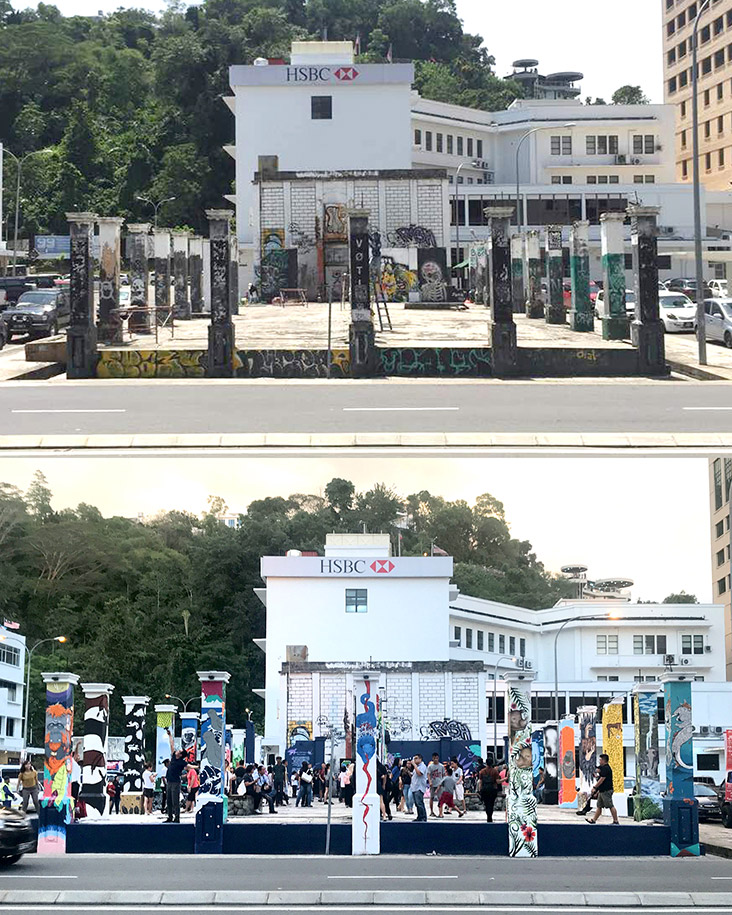KOTA KINABALU, May 14 — Where once the burnt-out pillars in the heart of this city were a reminder of a terrible fire which destroyed the handsome pre-World War II colonial-style Land and Survey Building… we now have a community art project.
Over the years the building was converted into the Social Welfare Department and then later the office for the Society for the Blind.
In the 1990s, there was a proposal that the heritage building be turned into an art gallery, but it caught fire in 1992 and all that was left were the concrete foundation and 30 pillars facing the open sky.
Last September, a group of artists turned the abandoned site into an art showcase; “Pillars of Sabah 1” focused on a selection of Sabah personalities who have achieved significant success or played a role in the state’s development.

In March this year, the artists turned their attention to Sabah’s renowned but depleting wildlife.
“Pillars of Sabah 2” was launched in conjunction with Earth Hour 2019, with 30 selected Sabah artists showcasing 30 different endangered animals from the state.
The project was led by film-maker Jared Abdul Rahman, designer Melissa Lo and artist Red Hong Yi with the support and sponsorship of WWF-Malaysia and Nippon Paint Malaysiai.
In a statement, they said: “Three of us grew up in Kota Kinabalu and initiated this project to bring the art community together and to show that through art, a neglected urban space can be turned into a safe, welcoming and vibrant public space.”

“Originally, the artists were chosen by searching through the Sabah Art Gallery directory as well as through local artists’ groups but this time round, with the project having built a name for itself, the organisers announced the project on social media,” said Jared.
By January, 30 artists were chosen to paint an endangered or threatened Bornean animal on each pillar, in their own style. All the artists also had to research and provide a write-up of their animal.
The 30 animals ranged from the iconic (orangutan, pangolin, Sumatran rhino and Borneo pygmy elephant) to the majestic (hornbills, manta rays, whale sharks and clouded leopard) to the barely known (Bornean bay cat, Bornean Crestless Fireback and the Bulwer’s Pheasant).

While not all are endemic to Sabah, all of the species can be found in Sabah.
As with any project, the group faced challenges. “The site gets HOT. Artists were working through rain and shine for 10 days.
“There were also theft cases when artists had their stuff stolen. One of the artists’ cell phone was stolen,” Jared said.
Even the wooden plank used as a bench at the site was also taken, but project organisers remain optimistic.

“The space is accessed by hundreds of people a day. And like all spaces intended for public use, there is always the risk of theft.
“It is true that the benches installed at the space have missing bench-tops, but this should not incite finger-pointing by any party. Such knee-jerk reaction would defeat the purpose of the project,” said Jared.
“Yes, there’s always potential for the space and artwork to become defaced, vandalised, or painted over. Especially given that the space used to be where street artists could express themselves.

“I think that the best way to assess the community’s appreciation for the project is to just let them do what they want. I believe that if we trust in people and the community, then we have nothing to fear. And if something does happen to go missing, it’s not the worst thing that could happen,” he added.
It’s not certain how long the current edition of the project will stay but as long as there is support, Jared believes the project will go on.
“As long as the project is allowed to use the space, with permission from the authorities as well as the community, it is the organisers’ hope to continue bringing the community together, through art, in celebration of what matters to the people of Sabah.
“The project has become a beacon of hope for many. In showing their support for the project, the community has voiced how inspiring it is to see the space brought to life,” he said.























